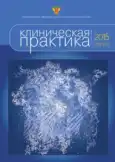Vol 6, No 2 (2015)
- Year: 2015
- Articles: 9
- URL: https://bakhtiniada.ru/clinpractice/issue/view/510
Articles
PRIMARY AND METASTATIC MUCINOUS OVARIAN CANCER. DIAGNOSTIC DIFFICULTIES AND NEWDEVELOPMENTS IN TREATMENT
Abstract
In order to improve the results of treatment of patients with malignant ovarian tumors the clinical, morphological and genetic characteristics of mucinous tumors were analyzed. There are 4 cases of mucinous ovarian tumors: the case of mucinous cystadenocarcinoma ovarian associated with dermoid cyst; the case of the giant metastases to ovarian from colorectal mucinous adenocarcinoma; the case of mucinous metastases to ovarian associated with malignant mesotheliomas; the case of the low-grade mucinous neoplasm (mucinous cystadenocarcinoma of the appendix) presented with pseudomyxoma peritonei and mucinous ovarian tumor.
Journal of Clinical Practice. 2015;6(2):5-14
 5-14
5-14


OPTIMIZATION OF BIOLOGICAL THERAPY IN PATIENTS WITH ULCERATIVE COLITIS (CASE REPORT)
Abstract
Now in Russia registered two biological drugs for the treatment of UC is infliximab and golimumab. The largest experience with the use of infliximab (IFX) shows that, despite the high efficiency, in some patients the IBD (20-30%) will develop acquired secondary loss of response to the drug. The development of secondary loss of anti-cytokine therapy is influenced by the following causes - irregular administration of the drug, monotherapy with monoclonal antibodies, initial high levels of TNF-α and low albumin, the presence of antibodies to the drug, activation of opportunistic infections, and changes in pathogenesis of the disease. The appearance at present in the arsenal of gastroenterologists of golimumab (GLM) has expanded the possibilities of treatment of patients with UC in the case of secondary loss of response to therapy with anti-TNF-α or the development of adverse events on IFX. This clinical case shows that after discontinuation IFX, there is a risk of recurrence of the disease, which according to the literature is 50 %. The example also demonstrated that GLM is well tolerated in patients who develop adverse events on IFX in the form of anaphylaxis. This is because GLM are fully human inhibitor of TNF-α. Golimumab is a new, effective inhibitor of TNF-α, which may help to optimize therapy in UC.
Journal of Clinical Practice. 2015;6(2):15-23
 15-23
15-23


 24-26
24-26


 27-30
27-30


A CASE OF AUTOIMMUNE LYMPHOPROLIFOACTIVE SYNDROME ( ALPS)
Journal of Clinical Practice. 2015;6(2):31-34
 31-34
31-34


GRAFTS FOR CORONARY SURGERY
Abstract
Results of surgical treatment of coronary heart disease, both immediate and distant, are directly depend on the consistency of shunts. The variety of factors that determine the good function of the conduit raises a difficult question before the surgeons: what kind of graft should be chosen in every situation? The article presents the analysis of the advantages and disadvantages of various conduits, methods of their application and factors that affect the viability of grafts in the near and in the future.
Journal of Clinical Practice. 2015;6(2):35-45
 35-45
35-45


ONCOLYTIC VIRUSES IN HIGH-GRADE GLIOMAS TREATMENT
Abstract
The review examines the state of the art of diagnosis and therapy of high-grade gliomas both by currently existing clinical guidelines, and from the point of view of the most promising approaches of currently undergoing laboratory tests and the first clinical trials. One of the most promising approach for the treatment of malignant gliomas is the nonpathogenic oncolytic viruses (OV) application. The data of preclinical trials of OV and the first preliminary results of clinical trials are discussed.
Journal of Clinical Practice. 2015;6(2):46-59
 46-59
46-59


EARLY BREAST CANCER. THE CONTROVERSY OF BREAST CANCER IN SITU
Abstract
Perfecting screening tests of breast cancer by introducing digital mammography has increased findings the initial stages of the growth (neoplasma) in situ up to 25% of all detected cases of breast cancer. It has lead to 98% of surgical or combined forms of treatment although the risk of the advance into intrusive cancer is observed only in 50% to 75% of patients. In this connection the search for the prognosis marker and the degree of the radicalism of the treatment of such patients is the most discussed questions on clinic forums. This article discusses the re-thinking of the problem of the initial stages of breast cancer and working-out the best possible approach to its treatment.
Journal of Clinical Practice. 2015;6(2):60-65
 60-65
60-65


EXPERIMENTAL AND THEORETICAL STUDY OF ANTIMICROBIAL PROPERTIES OF CATIONIC PHTHALOCYANINES
Abstract
The article is devoted to the work of the laboratory of molecular modeling and bioinformatics of Federal Scientific and Clinical Center of FMBA of Russia. The problems of photodynamic inactivation of bacteria, examining electrostatic interaction of the cationic phthalocyanines with lipopolysaccharides - endotoxins of gram-negative bacteria, the sorption properties of heterogeneous cationic phthalocyanines against lipopolysaccharides are discussed. Computer simulation of the outer membrane of Gram-negative bacteria and phthalocyanine molecules is also discussed.
Journal of Clinical Practice. 2015;6(2):66-72
 66-72
66-72







